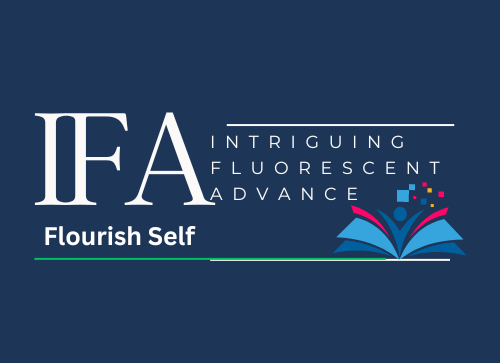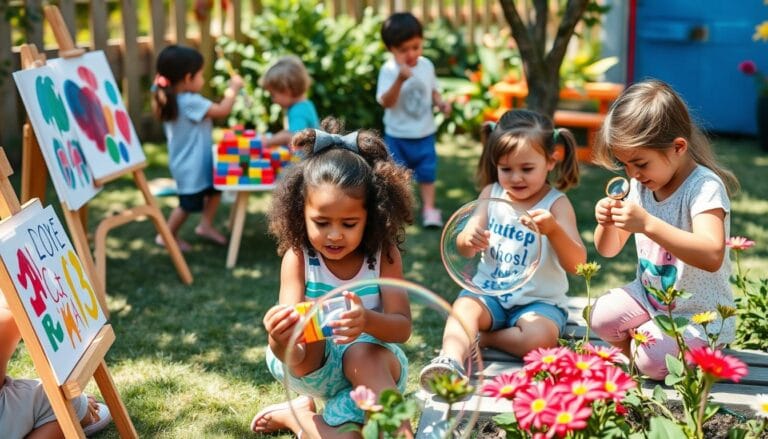
Inspiring Parenting Books Nurture with Wisdom
Parenting is a beautiful journey filled with joys and challenges. It’s a chance for growth. We want to give our children the best upbringing, caring for their physical, emotional, and mental health. Parenting books are great guides, offering insights and strategies for each stage of child development.
The world of parenting books is vast, with many titles promising to help. But not all are equal. It’s key to choose books that are researched-based, expert-approved, and relatable. This article lists must-read parenting books that cover topics from early childhood to adolescent psychology. They are chosen for their ability to inspire, educate, and empower parents.
Positive parenting books are becoming more popular. Parents see the value in building strong, healthy relationships with their kids. These books offer tools for self-awareness, communication, and strengthening the parent-child bond. By using these strategies, parents can create a loving environment that supports their children’s growth and well-being.
Key Takeaways:
- Parenting books offer invaluable guidance, insights, and practical strategies for nurturing children throughout various stages of development.
- Choosing parenting books backed by research, expert advice, and real-life experiences is crucial for effective implementation.
- Positive parenting books focus on fostering strong, healthy relationships between parents and children.
- Implementing strategies from parenting books can create a loving, supportive environment that promotes children’s overall well-being.
- A curated list of must-read parenting books can inspire, educate, and empower parents on their journey of nurturing their children with wisdom and love.
The Importance of Parenting Books in Child Development
Parenting is a lifelong journey filled with joys and challenges. It’s a time for growth and learning. Parenting books are key resources, offering knowledge and advice to support our children’s development.
Constant Learning and Adaptation in Parenting
Parenting changes over time. What works for one child may not work for another. Parenting books help us learn and adapt to our children’s needs.
Here are some interesting facts about parenting books:
| Statistic | Implication |
|---|---|
| Parenting books account for 4 of the top 7 most highlighted books in the Readwise database | Parents actively seek guidance and wisdom from parenting books, indicating their value and relevance |
| Multiple authors emphasize the importance of stable homes in child development and parenting strategies | Creating a nurturing and consistent environment is essential for children’s overall well-being and growth |
| Children learn almost exclusively from immediate feedback rather than discussion | Parenting books can help us understand the impact of our actions and interactions on our children’s learning and development |
Books as Invaluable Resources for Guidance and Insights
Parenting books are trusted guides, filled with knowledge from experts. They help us navigate parenting’s complexities. They cover topics like attachment, discipline, and emotional intelligence.
The power of parenting books lies in their ability to validate our experiences, challenge our assumptions, and inspire us to be the best parents we can be.
Whether you’re a new parent or an experienced caregiver, there’s a book for you. These books offer insights and advice. By using this wisdom, we can create a nurturing environment for our children to thrive.
Must-Read Parenting Books for Every Stage of Childhood
As parents, we all want to give our children the best care and guidance. Parenting books are full of valuable insights and strategies. They help us deal with the ups and downs of raising kids at every age. From the early days of infancy to the complex emotional and social needs of teens, these books cover it all.
Early Childhood Development Books
The early years are key for a child’s development, and parents play a big role. “The Wonder Weeks” offers insights into babies’ mental and physical milestones. It has sold over 2 million copies and has an app with over 4 million downloads.
“The Baby Sleep Solution” helps infants sleep through the night. “Brain Rules for Baby” focuses on raising smart and happy kids from birth to five. It uses the latest in brain science.
“The Postnatal Depletion Cure” is a must-read for new moms. It talks about rebuilding health and energy after having a baby. It explains the big changes women go through during and after pregnancy.
By focusing on self-care, moms can better support their own health. This helps them care for their children even better.
Adolescent Psychology Books
Adolescence brings new challenges and opportunities for growth. Understanding this stage is key for effective support. “The Child Whisperer” and “The 5 Love Languages of Children” highlight the importance of knowing and meeting each child’s needs.
By tailoring our parenting to each child, we can build stronger bonds. This is especially important during adolescence.
For parents of sensitive kids, “The Sensitive Child” offers strategies for emotional well-being. “How to Talk So Kids Will Listen & Listen So Kids Will Talk” teaches effective communication. It helps promote understanding and respect between parents and teens.
| Book Title | Author(s) | Key Focus |
|---|---|---|
| The Wonder Weeks | Hetty van de Rijt, Frans Plooij | Mental and physical development milestones in babies |
| The Baby Sleep Solution | Suzy Giordano, Lisa Abidin | Proven program for teaching babies to sleep through the night |
| Brain Rules for Baby | John Medina | Raising smart and happy children from birth to age five |
| The Postnatal Depletion Cure | Dr. Oscar Serrallach | Rebuilding health and energy for mothers after giving birth |
| The Child Whisperer | Carol Tuttle | Understanding and responding to each child’s unique personality |
| The 5 Love Languages of Children | Gary Chapman, Ross Campbell | Discovering and speaking your child’s love language |
| The Sensitive Child | Janet Poland, Pres. William J. Clinton | Helping sensitive children thrive in a challenging world |
| How to Talk So Kids Will Listen & Listen So Kids Will Talk | Adele Faber, Elaine Mazlish | Effective communication strategies for parents and children |
Exploring these parenting books can give us the knowledge and confidence to support our children at every stage. Whether it’s the early years or adolescence, these books offer valuable guidance and inspiration. They help us fulfill the most important job we’ll ever have – being a parent.
“The Whole-Brain Child”: Nurturing Your Child’s Developing Mind
In their groundbreaking book, “The Whole-Brain Child”, Daniel J. Siegel and Tina Payne Bryson share a new way to parent. They use brain science to help parents raise emotionally smart kids. This approach gives parents tools to help their children grow and feel their feelings.
The book has twelve strategies to help kids’ brains work better. These include “Name It to Tame It” and “Engage, Don’t Enrage.” They help parents deal with tantrums and teach kids to manage their emotions.
“The Whole-Brain Child” talks about the “upstairs brain,” which helps with decisions and feelings. Siegel and Bryson say this part of the brain is still growing until the mid-twenties. They show how important it is for parents to help during this time.
They also talk about teaching kids about their brain and body. This helps kids learn to control their feelings and actions. The book uses stories and tips to show how important it is to connect with our kids.
“The Whole-Brain Child” is a must-read for any parent seeking to raise emotionally intelligent and resilient children. By applying the book’s strategies, parents can create a nurturing environment that promotes healthy brain development and sets the stage for a lifetime of success.
The book is easy to follow with chapter sub-headings and a summary “refrigerator sheet.” It’s a New York Times Bestseller because of its engaging stories and helpful advice.
| Book Details | Information |
|---|---|
| Title | “The Whole-Brain Child” |
| Authors | Daniel J. Siegel and Tina Payne Bryson |
| Publisher | Random House Publishing Group |
| Publication Date | September 11, 2012 |
| Format | Paperback |
| Price | $19.00 |
“The Whole-Brain Child” is great for new and experienced parents. It teaches you how to use brain science to help your child. By using these strategies, you can create a loving space for your child to grow and succeed.
Effective Communication Strategies in “How to Talk So Kids Will Listen & Listen So Kids Will Talk”
Good communication is key in any relationship, especially between parents and kids. Adele Faber and Elaine Mazlish’s book “How to Talk So Kids Will Listen & Listen So Kids Will Talk” offers great advice. Published in 1980, it’s a classic for parents wanting to connect better with their children.
Active Listening and Expressing Emotions
The book stresses the importance of active listening. By really listening to our kids, we make a safe space for them to share their thoughts and feelings. It’s not just about hearing their words but also understanding their emotions.
Faber and Mazlish also talk about letting kids express their feelings. This helps them learn to handle their emotions and solve problems. It builds trust and emotional intelligence in the parent-child relationship.
Problem-Solving and Building Trust
The book also focuses on solving problems together. Instead of punishing or lecturing, it suggests finding solutions as a team. This teaches kids valuable skills and shows respect for their views.
Through honest communication and teamwork, parents can build trust with their kids. When kids feel heard and valued, they’re more likely to trust and confide in their parents.
| Book Attribute | Value |
|---|---|
| Number of Pages | 368 |
| Price | $5 |
| ISBN | 9781451663884 |
| Publisher | Scribner |
| Overall Customer Rating | 4.5 out of 5 stars |
| Number of Ratings | 4,609 |
“How to Talk So Kids Will Listen & Listen So Kids Will Talk” has been a favorite for many years. It helps families create a loving and respectful environment. This way, kids can grow emotionally and socially strong.
Self-Reflection and Mindful Parenting in “Parenting from the Inside Out”
In the book “Parenting from the Inside Out,” Daniel J. Siegel and Mary Hartzell explore how self-reflection and mindful parenting affect the parent-child relationship. They use new neurobiology and attachment research to help parents understand their past and how it influences their parenting.
The book, published in 2013, has received lots of praise. Celebrities like Gwyneth Paltrow and Kate Capshaw Spielberg have endorsed it. With 336 pages of insights, it’s a key resource for parents wanting to raise emotionally smart kids.
Siegel and Hartzell stress the need to deal with past issues. These can affect how we react to our kids. By reflecting on our past and writing about it, we can better connect with our children.
The book talks about seven ways to communicate with others, including empathy and understanding. Learning these skills helps parents create a caring family environment. This makes handling the parent-child relationship easier.
“Parenting from the Inside Out” is not just a book; it’s a transformative journey that empowers parents to become the best versions of themselves and nurture their children’s developing minds with wisdom and love.
Some key points from the book are:
- The link between personal growth and good parenting
- Ways to fix problems in the parent-child bond
- The importance of a caring family atmosphere
By practicing mindful parenting and reflecting on ourselves, we can build stronger bonds with our kids. “Parenting from the Inside Out” is a vital guide for anyone wanting to improve their parenting skills.
| Book Details | Information |
|---|---|
| Price | $18.00 US | $24.00 CAN |
| Publisher | Penguin Adult HC/TR | TarcherPerigee |
| Release Date | Dec 26, 2013 |
| Number of Pages | 336 |
| ISBN | 9780399165108 |
| Awards | Finalist, Nautilus Award |
Books like “Parenting from the Inside Out” offer hope and guidance for parents. They mix the latest in neuroscience and attachment theory with practical tips for mindful parenting. Siegel and Hartzell have created a powerful tool for raising emotionally smart, resilient kids. If you’re looking to grow as a parent and strengthen your bond with your child, this book is a great choice.
Implementing Montessori Principles with “The Montessori Toddler”
Simone Davies, an AMI Montessori teacher from Amsterdam, has changed how parents teach young children. Her book “The Montessori Toddler” was published by Workman Publishing Company on March 19, 2019. It’s a key guide for parents wanting to spark their child’s curiosity and love for learning.
Davies uses Dr. Maria Montessori’s timeless ideas. These ideas focus on a prepared environment, independence, and hands-on learning. By applying these ideas at home, parents can help their toddlers grow in many ways.
Creating a Prepared Environment
The Montessori method emphasizes a prepared environment. Davies shows parents how to make their homes inviting for exploration and learning. By choosing the right materials and organizing them well, parents help their toddlers learn and grow.
Promoting Independence and Love for Learning
The Montessori approach aims to foster a love for learning and independence. “The Montessori Toddler” gives parents tips on supporting their child’s growing independence. This includes letting them help with daily tasks and making choices.
Davies shares her knowledge through online workshops and classes at Jacaranda Tree Montessori school. Her insights, along with the Montessori method, help parents create a supportive home environment. This environment encourages their child’s growth and development.
| Book Title | Author | Publication Date | Pages | Price |
|---|---|---|---|---|
| The Montessori Toddler | Simone Davies | March 19, 2019 | 256 | $20.00 |
“The Montessori Toddler” is part of the Montessori Family Collection. It’s a valuable resource for parents who want to use a caring and effective parenting approach. By following the Montessori principles in this book, families can support their toddler’s growth and foster a lifelong love of learning.
Simplicity Parenting: Reducing Clutter and Promoting Well-Being
In today’s fast world, parents often feel the need to give their kids lots of activities and stuff. Kim John Payne, M.Ed., offers a fresh view in his book “Simplicity Parenting,” first published in 2009. With over 30 years of experience, Payne shows how minimalism can help create a better home for kids.
“Simplicity Parenting” teaches that less clutter, noise, and stimulation can make family life better. Payne says too many toys and choices can make kids value nothing. He suggests cutting kids’ toys in half, then by another half.
Payne advises getting rid of certain toys, like:
- Broken toys
- Developmentally inappropriate toys
- High-stimulation toys
- Duplicates
- Toys that inspire bad behavior
By simplifying, kids can focus better, play deeper, and explore more. Payne also says to limit food choices, focusing on what’s good for them, not just fun.
“By simplifying, we protect the environment for childhood’s slow, essential unfolding of self.” – Kim John Payne, “Simplicity Parenting”
“Simplicity Parenting” also talks about the value of unstructured play and less screen time. Payne says open communication is key. He believes in the benefits of repetitive play for kids’ growth and calmness.
For young readers, Payne suggests a few easy-to-reach books. This helps kids focus and enjoy reading. It also helps them feel secure and happy.
By following “Simplicity Parenting,” parents can make a safe space for kids to grow. This helps kids be strong and do well in a busy world.
Fostering a Growth Mindset with “Mindset: The New Psychology of Success”
Carol S. Dweck, Ph.D., a renowned psychologist from Stanford University, wrote “Mindset: The New Psychology of Success.” This book, first published in 2007, has sold over a million copies. It has changed how we see human potential and success.
Dweck’s work shows the difference between fixed and growth mindsets. People with a fixed mindset think traits can’t change. But those with a growth mindset believe they can grow and improve with effort. This mindset helps kids become resilient, take on challenges, and love learning.
Praising Effort and Embracing Challenges
One key way to help kids grow is to praise their effort and learning. Not just their achievements. This teaches them the value of hard work and learning from mistakes. It helps them see challenges as chances to grow and learn.
“If parents want to give their children a gift, the best thing they can do is to teach their children to love challenges, be intrigued by mistakes, enjoy effort, and keep on learning.” – Carol S. Dweck, Ph.D.
Teaching Resilience and Lifelong Learning
Dweck’s research highlights the need to love learning and believe in growth. By teaching kids to see failures as steps to success, parents build resilience. This mindset helps kids face obstacles and chase their dreams with determination. A mindful parenting approach that focuses on effort and learning can greatly impact a child’s future.
| Book Details | Information |
|---|---|
| Author | Carol S. Dweck, Ph.D. |
| Pages | 320 (paperback) |
| Publication Date | December 26, 2007 |
| ISBN-10 | 0345472322 |
| ISBN-13 | 978-0345472328 |
| Item Weight | 8.4 ounces |
| Dimensions | 5.2 x 0.7 x 8 inches |
By using “Mindset: The New Psychology of Success” in parenting, caregivers can help kids grow. They will become resilient, adaptable, and love learning. This gift will help kids reach their full potential and achieve their dreams.
The Power of Play in Child Development
In “The Power of Play,” David Elkind explores how unstructured play boosts kids’ creativity, problem-solving, and emotional health. Play is more than just fun; it’s key for kids to learn, communicate, and understand the world.
Kids naturally use play to express themselves and share their thoughts. Through play, they grow confident and learn to define their own experiences. Elkind says play lets kids make the world their own.
“Play is not a luxury but rather a crucial dynamic of healthy physical, intellectual, and social-emotional development at all age levels.” – David Elkind
Unstructured play sparks kids’ curiosity and creativity. It lets them choose what they want to do and learn. This way, they develop skills like problem-solving, resilience, and adaptability. They also learn to interact with others, make rules, and solve conflicts.
| Benefits of Unstructured Play | Impact on Child Development |
|---|---|
| Encourages creativity and imagination | Fosters divergent thinking and innovation |
| Develops problem-solving skills | Builds resilience and adaptability |
| Promotes social-emotional learning | Enhances communication and empathy |
| Supports physical development | Improves coordination and motor skills |
Play is also vital for kids’ emotional health. It helps them deal with their feelings and understand themselves. Playing with parents strengthens their bond and makes their relationship better.
But today, play is often seen as less important. Elkind warns that without play, kids can feel stressed, anxious, and less creative. By valuing play, parents can help their kids grow and keep a love for learning alive.
Conclusion
Parenting is complex and always changing. We need the right knowledge and tools to help our children grow. The books mentioned in this article offer valuable insights and strategies.
They help us understand our children’s needs better. We learn how to communicate and support them effectively. This way, we can unlock their full potential.
Parenting books cover important topics like mindful parenting and promoting independence. They encourage us to think deeply about our parenting. By using their advice, we can create a supportive environment for our children to flourish.
Remember, every child is different, and there’s no single way to parent. By being open to learning and growing with our children, we build a strong bond. This bond is based on trust, respect, and love.
With the wisdom from these books, we can guide our children through life’s ups and downs. We help them become strong, caring, and fulfilled people. Let’s use this knowledge to make a positive impact on our children and the world they will create.

















